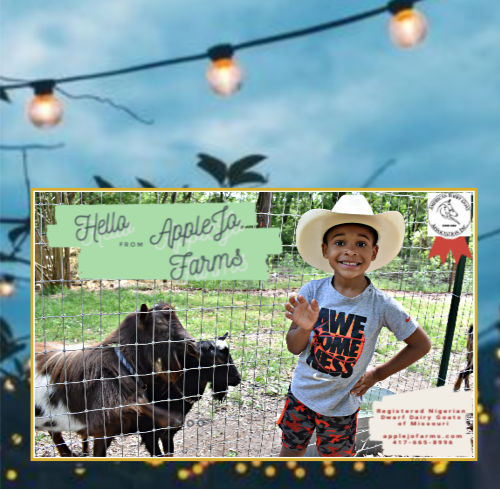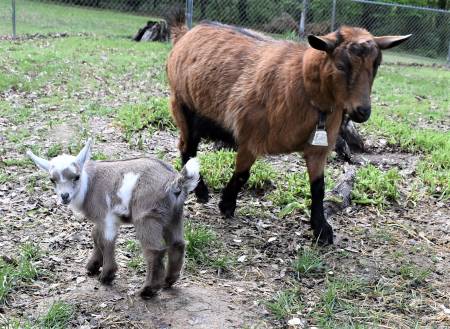Preventing URINARY CALCULI IN GOATS
Preventing and Dealing with Urinary Calculi in Wethers & Bucks
Urinary Calculi is one of the most serious conditions your bucks & wethers can have and is preventable.
Although the disease is called Urinary Calculi, the real culprit is phosphorus, specifically too much phosphorus in relation to the amount of calcium in the diet. Feeding too much grain concentrates and/or feeding grain concentrates with an improper calcium-to-phosphorus ratio is the primary cause of Urinary Calculi. Overfeeding or improper feeding of grain concentrates causes solid particles to develop in the urine. These solid particles block the flow of urine out of the goat's body, causing great pain, discomfort, and oftentimes death.
Urinary Calculi is almost always the result of improper feeding. A proper calcium to phosphorus ratio in feed/hay/minerals is critical; this ratio should be 2-1/2 to 1.
Other factors can affect the calcium-to-phosphous ratio in the goat's diet. If the minerals and pelleted feed being fed have the proper calcium-to-phosphorus ratio and the goats have access to sufficient long fiber (forage/browse, hay), then you should have both water and hay tested for mineral content. Many types of hay (Bermuda is one example) are high in phosphorus. Hay fertilized with chicken litter will be even higher in phosphorus levels. Adding calcium carbonate (ground limestone) to the goats' diet can help bring the calcium-to-phosphorus ratio to the 2-1/2 to 1 range. You must work with a goat nutritionist to determine the right amount of calcium carbonate to add to the goats' diet to get these ratios right.
Goats used for show purposes are prone to Urinary Calculi because their owners tend to over-feed them with grain concentrates to get them in top condition. Young wethers (castrated males) are especially susceptible to Urinary Calculi. Castration stops both testosterone production and the growth of the diameter of the urethra. Solid particles cannot pass through a urethra that has not been given the opportunity to grow to its normal diameter. The chance of contracting Urinary Calculi in male show goats can be reduced by not wethering (castrating) them until they are five to six months of age, giving the diameter of the urethra time to grow. Castration of a goat of this age should be done under sedation by a veterinarian. The addition of hay or some other type of long fiber to the goat's diet is essential to help avoid Urinary Calculi. This is a big problem with some show-goat folks because they tend to take goats off long fiber and push grain concentrates. This often results in urinary calculi.
Urinary Calculi requires immediate medical attention. This condition will not correct itself and if left untreated, the goat will die. Symptoms of Urinary Calculi include tail twitching in males, restlessness, anxiety, and a "hunched-up" body posture as the goat strains to urinate. If your buck or wether does not have any interest in eating, this is an early sign and must be addressed immediately. You can mis-diagnose the problem as constipation or bloat because of goat's behavior and body stance. You should closely examine any male exhibiting these symptoms. Watch for signs of difficulty with urination.
To examine the penis by extending it out of the urethral shaft, sit the goat on its rump for easier handling and manually work the penis out of the shaft for visual examination. This can be impossible to do in goats wethered very young because the penile shaft may still be adhered to the urethral process; this is another drawback of wethering at a very young age. (A sign of sexual maturity in a buckling is his ability to extend his penis out of the shaft.)
Before a male can be catheterized to relieve a build-up of urine, the pizzle must be cut off. An experienced goat raiser can do this, but most folks should have this procedure performed by a qualified veterinarian. The pizzle is the "curley-qued" appendage on the end of the penis that allows the male goat to direct his urine stream. The pizzle of a goat with Urinary Calculi is usually black and crusty. Removal of the pizzle does not affect breeding ability. If this treatment is unsuccessful, the goat must be taken immediately to a qualified veterinarian for possible surgery. If you wait too long , the goat's bladder will burst and he will die. Surgical success depends upon the location in the urethral tract where the stones are lodged.
Do not force a goat with Urinary Calculi to drink lots of water. If fluids can't leave the body because the exit is blocked, the only alternative is for the bladder to burst. A burst bladder cannot be fixed and is fatal. Within 24 to 48 hours after the onset of Urinary Calculi ,the untreated goat's bladder may burst and the flow of urine into the sub-cutaneous tissues on the underside of the body ("Water Belly") will precede a quick and painful death.
Ammonium chloride in powder form is used to treat Urinary Calculi & also prevent it. Ammonium chloride can be purchased from Jeffers Livestock Supply (1-800-533-3377) or www.jefferslivestock.com or at your local feed mill or farm store. It is very inexpensive.
I have had this condition occur twice, once with my wether and once with a buck. I took the first one to the vet and the following information brought a good outcome to both of my goats. I cannot emphasize enough how important early detection is to having this non-surgical solution work. Also, my Vet says, the surgical solutions have very low success rates. So catch it early!
DOSAGE: Mix the following in 1/2 cup water 2 times for 2 days by oral drench : One (1) teaspoon Ammonium chloride per 75 lbs bodyweight every 12 hours for 2 days, then 1/2 tsp AC per 75 lbs bodyweight every 12 hours for the next 3 days, then 1/2 tsp once a day for 3 days, then 1/4 tsp daily as a preventative. My vet recommends adding 1 tsp. Ammonium Chloride to the males feed daily, every day. Dosages are based upon 75 lb liveweights. If his condition is such that he cannot eliminate urine at all, use only a small amount of water or juice to get the Ammonium chloride down him. Ammonium chloride burns the throat, so mix it with a liquid that will calm the burn (cranberry juice is an option) and give orally. Some recommend adding 1 tsp. crushed limestone to the daily feed portion as well.
Additional Information on treatment:
Treatment: With the assistance of my Vet I personally have developed a treatment that has worked both times this happened to a male goat at my farm.
- Key: Catch it immediately!
- Do not force an animal with Urinary Calculi to drink lots of water; if fluids can't leave the body because the exit is blocked, the only alternative is for the bladder to burst. A burst bladder cannot be fixed and is fatal.
- Those crystals must be dissolved for the goat to be able to pee.
- I mix 1 tsp. of powdered ammonium chloride + 1 capsule (opened and emptied into mix) of a TRIPLE ACTION FORMULA Nutrient which I purchase on Amazon called
Wiseceutical Chanca Piedra & Hydrangea. This Supplement also contains Dandelion Root and is a Natural Kidney & Gallbladder Formula and considered an effective Stone Breaker, Flushes Impurities, Cleanses the Urinary Tract - and is Enhanced with BioPerine.
Mix the ammonium chloride & 1 opened Supplement Capsule and 1 baby aspirin crushed with 1/8th of a cup of water or less (just enough water to dissolve ammonium chloride & Supplement & aspirin) and fill a 6 ml syringe with this mixture. Administer 3 times for 2-3 days or until goat is back to normal eating and drinking and hanging out with the herd. - Note: if the condition is severe or not improving by day 2, I additionally mix 1 tsp ammonium chloride and 1 capsule opened of Supplement with peanut butter & flour & 1 baby aspirin crushed and give like a bolus.
- How to Identify your goat has a problem with UC: if he is straining to pee or his stream is small or his urine has blood in it, he likely has UC. He also will have ceased eating anything or drinking usually.
- How to Proceed: The goat must be taken off all grain concentrates and offered only grass hay, fresh green leaves, and water during the treatment regimen. This is not usually a problem since the goat is so sick that it is struggling to live and isn't interested in eating or drinking.
- Immediate veterinary assistance is highly recommended when Urinary Calculi is suspected. However, honestly, your Vet can do little to help your goat if he has UC. So use Prevention and take it seriously.
- Very rarely Urinary Calculi may be the result of the mineral content of the water that the goat is drinking. The local county extension office should be able to test the water to determine mineral content. You can easily test the pH of the goats' water supply by purchasing a fish-tank testing kit. The water's pH should be neutral (a pH of 7).

The key to avoiding Urinary Calculi is feeding the goat a proper diet. Goat raisers who are experiencing Urinary Calculi in their goats must change their feeding regimens. Carefully read feed labels for proper calcium-to-phosphorus ratios (2-1/2 to 1). While some prepared goat feeds contain ammonium chloride in the formulation, this is no guarantee that Urinary Calculi will be avoided.
What to do: Offer lots of free-choice forage/browse and good-quality grass hay (NOT ALFALFA!) and reduce the amount of grain concentrates being fed. Offer fresh water daily to all goats. If it is not fresh daily, many goats won't drink enough water.
As is the case with so many things with raising goats, proper management is the key. Prevention of Urinary Calculi is the best route. Urinary Calculi is difficult to fix and can be chronic or fatal.
thanks to: Suzanne W. Gasparotto, Onion Creek Ranch, Texas for this information
Important! Please Read The Following Notice!
All information provided in these articles is based either on personal experience or information provided by others whose treatments and practices have been discussed fully with a vet for accuracy and effectiveness before passing them on to readers. Much of my page content is from Veterinary Colleges and Manuals.
In all cases, it is your personal responsibility to obtain veterinary services and advice before using any of the information provided in these articles. JoAnna Mertz is not a veterinarian. Neither JoAnna Mertz nor applejofarms.com nor any of the contributors to this website will be held responsible for the use of any information contained herein.



Powered by Boutique Store Builder . Web Design by Avalon Rose Design.


